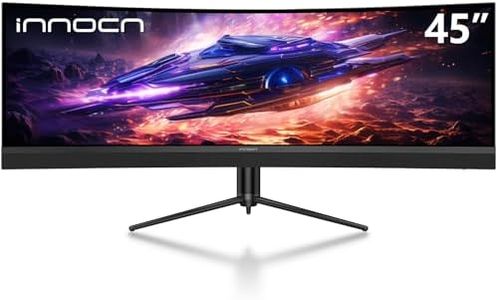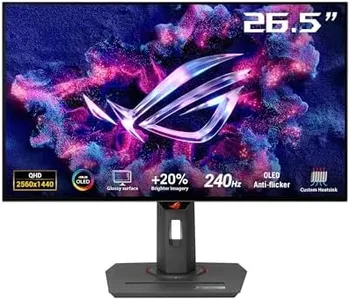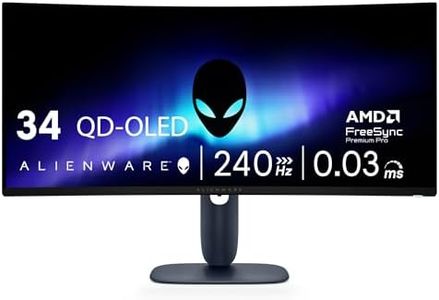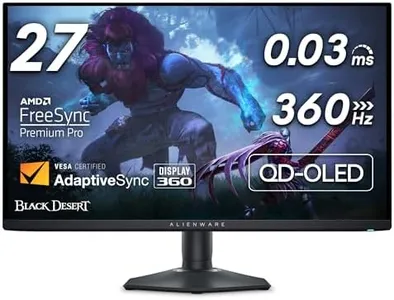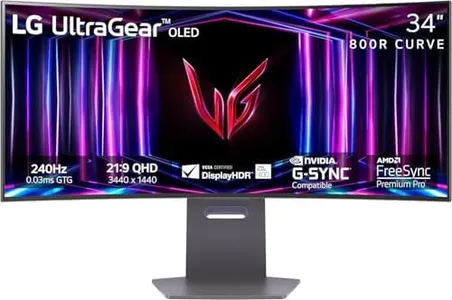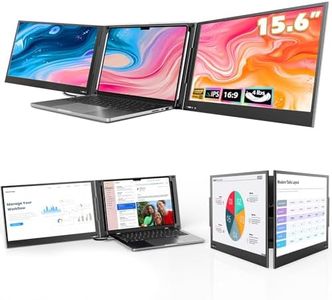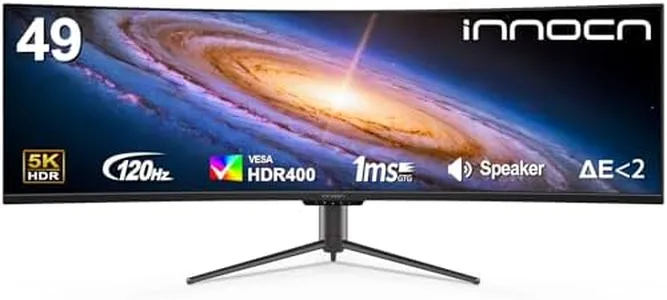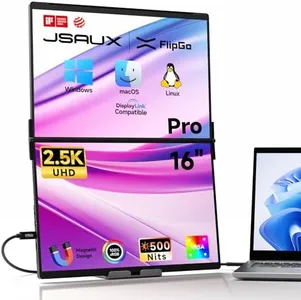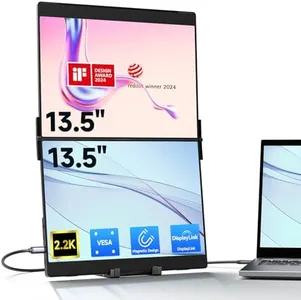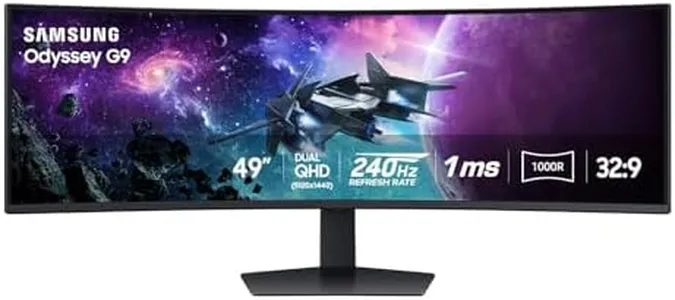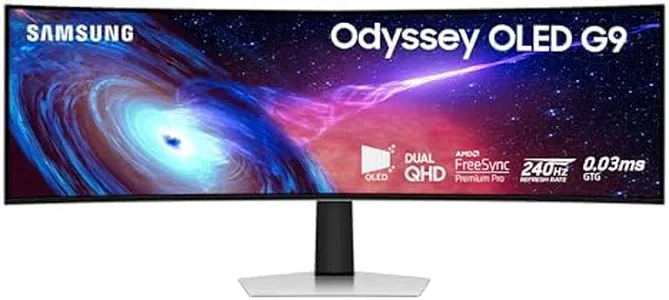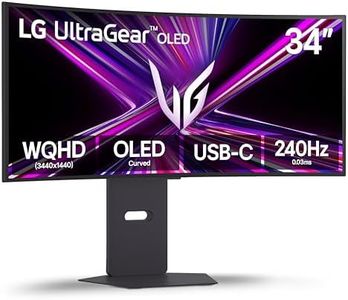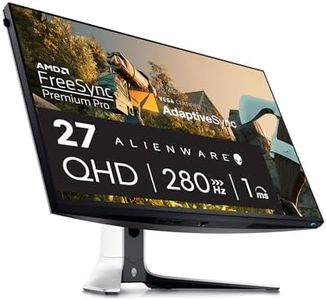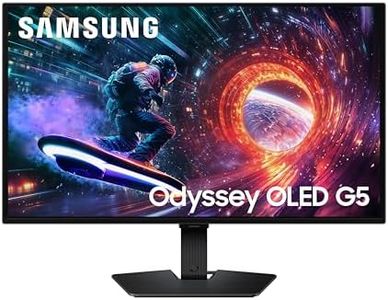10 Best Gaming Monitors 2026 in the United States
Our technology thoroughly searches through the online shopping world, reviewing hundreds of sites. We then process and analyze this information, updating in real-time to bring you the latest top-rated products. This way, you always get the best and most current options available.

Our Top Picks
Winner
ASUS ROG Strix 27” 1440P OLED Gaming Monitor (XG27AQDMG) - QHD, Glossy OLED, 240Hz, 0.03ms, Custom Heatsink, Anti-flicker,Uniform Brightness, G-SYNC Compatible, 99% DCI-P3, DisplayWidget, 3yr warranty
Most important from
5730 reviews
The ASUS ROG Strix 27” 1440P OLED Gaming Monitor is an impressive display tailored for gamers. The QHD resolution (2560 x 1440) combined with a 16:9 aspect ratio provides clear and vibrant visuals, perfect for both gaming and multimedia tasks. The standout feature is its 240 Hz refresh rate and lightning-fast 0.03 ms response time, ensuring smooth and responsive gameplay, especially in fast-paced games.
Its glossy OLED panel delivers deep blacks and excellent color accuracy, with 99% DCI-P3 coverage appealing heavily to those who appreciate vivid and accurate colors. The G-SYNC compatibility minimizes screen tearing, enhancing the gaming experience further. However, the glossy surface might be reflective under bright lighting conditions, which could be distracting in well-lit environments.
The custom heatsink and advanced airflow design are smart additions to combat OLED burn-in, a common concern with OLED panels. ASUS’s Anti-flicker technology and uniform brightness setting contribute to a comfortable viewing experience by reducing eye strain and maintaining consistent luminance. At 26.5 inches, the monitor is slightly smaller than the typical 27-inch standard, but this is a minor difference. This gaming monitor is ideal for serious gamers who prioritize speed, color accuracy, and immersive visuals. It might be less suitable for those who frequently use their monitor in brightly lit rooms due to the potential glare from the glossy screen.
Most important from
5730 reviews
Alienware 34 240Hz QD-OLED Curved Gaming Monitor - AW3425DW - 34.2-inch WQHD (3440 x 1440) 0.03ms Display, 1800R Curve, AMD FreeSync Premium Pro, VESA AdaptiveSync, DisplayHDR TrueBlack 400
Most important from
1044 reviews
The Alienware AW3425DW is a high-end 34.2-inch curved gaming monitor designed to offer an immersive ultrawide experience with its 3440 x 1440 (WQHD) resolution and 21:9 aspect ratio. Its standout features include a very fast 240Hz refresh rate and an incredibly quick 0.03ms response time, ensuring games appear smooth and sharp with minimal motion blur—ideal for fast-paced gaming.
The QD-OLED panel delivers excellent color accuracy, covering 99.3% of the DCI-P3 color space, along with deep blacks and vibrant visuals thanks to its infinite contrast and DisplayHDR TrueBlack 400 support. The 1800R curved screen helps draw you into the game world by matching the natural curve of your eyes. Adaptive sync technologies like NVIDIA G-SYNC Compatible, AMD FreeSync Premium Pro, and VESA AdaptiveSync reduce screen tearing and stuttering for smoother gameplay across different graphics cards.
Connectivity options are solid. Being a premium QD-OLED monitor, it comes with a hefty weight of 20 pounds and likely a high price tag, which may not be ideal for casual gamers or those on a budget. The ultrawide 21:9 aspect ratio might require some game compatibility checking, as not all titles support it perfectly. This monitor suits serious gamers who want top-tier visuals and speed in a visually immersive format, particularly if paired with a powerful gaming PC.
Most important from
1044 reviews
Alienware AW3423DWF Curved QD-OLED Gaming Monitor - 34-inch Quantum Dot OLED 0.1Ms 165Hz 21:9 Curved Display, 99.3% DCI-P3 Color Gamut, VESA DisplayHDR True Black 400, AMD FreeSync Premium Pro - Black
Most important from
1044 reviews
The Alienware AW3423DWF Curved QD-OLED Gaming Monitor is a stellar choice for gamers who value high performance and visual excellence. Its 34-inch Quantum Dot OLED display provides impressive color accuracy with 99.3% DCI-P3 color gamut coverage and a sharp WQHD 3440 x 1440 resolution. This monitor offers a swift 165Hz refresh rate via DisplayPort, ensuring smooth gameplay, and a remarkable 0.1ms response time, which is crucial for fast-paced gaming activities.
The 21:9 aspect ratio and 1800R curvature enhance the immersive experience, making it ideal for both gaming and content creation. Additionally, AMD FreeSync Premium Pro and VESA AdaptiveSync technologies help eliminate screen tearing and stuttering, contributing to a seamless gaming experience. The monitor's design is both functional and aesthetically pleasing, featuring customizable RGB AlienFX lighting, effective cable management, and adjustable stand options for optimal ergonomics. The matte screen surface reduces glare, contributing to a better viewing experience in different lighting conditions.
However, the monitor's high performance does come at a cost – both financially and in terms of power consumption, as it requires 240 volts (AC). Despite being relatively new to the market, as indicated by its release date in September 2023, it has garnered positive feedback. The 3-year premium warranty, including coverage for OLED burn-in, offers additional peace of mind. In conclusion, the Alienware AW3423DWF is best suited for gamers and content creators who demand high-end performance, vibrant and accurate visuals, and a highly immersive viewing experience.
Most important from
1044 reviews
Buying Guide for the Best Gaming Monitors
Choosing the right gaming monitor is about matching the monitor’s features with the type of games you play, your hardware, and how you like to experience those games. Gaming monitors come with a variety of specifications, and understanding what each feature does can help you make a smarter choice that will enhance your enjoyment and comfort.FAQ
Most Popular Categories Right Now
